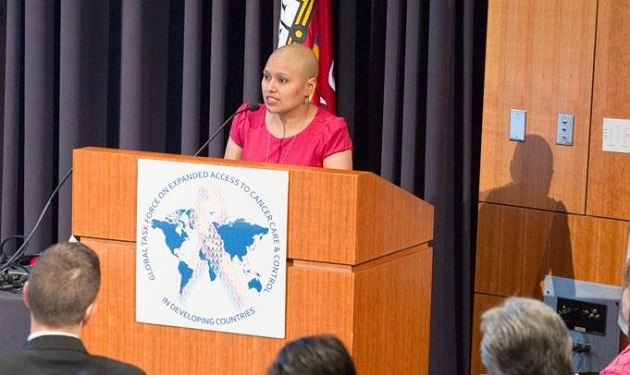Abish Romero is preparing to celebrate: in a few months she will mark 5 years free of breast cancer, after receiving successful treatment in her home country of Mexico. But the 28-year-old, whose mother died from late diagnosed breast cancer several years ago, had to make some tough choices before her care started in 2011.
Abish was working outside of Mexico as an au pair, when she was diagnosed with stage II breast cancer, and had to return home to receive the treatment needed.
“I had no option but to return to Mexico, where free public health insurance (called Seguro Popular) ensures all women diagnosed with breast cancer can be treated with no out-of-pocket expense,” says Abish, who underwent extensive surgery and chemotherapy.
While many nations cannot afford expensive cancer medicines, Mexico is an example of a middle-income country that has taken major structural steps to give sustainable access to treatment for people diagnosed with breast and other forms of cancer. It has done this by reforming and consolidating their procurement policies to achieve price reductions for essential medicines.
The example of Mexico is one that WHO is striving to see emulated globally through implementation of the WHO Model List of Essential Medicines as part of a broader approach to strengthening national health systems.
The list of essential medicines serves as a model for countries to follow in enabling the treatment of the most curable high-burden diseases, including adult and childhood cancers.
WHO Model List of Essential Medicines
In May 2015, 16 new medicines for treating cancers were added to the latest edition of the WHO Model List of Essential Medicines, a powerful signal by WHO and cancer control advocates to governments to step up cancer care and guide national efforts to strengthen their health systems.
These new cancer medicines include imatinib (for treating chronic myelogenous leukemia), rituximab (for some types of non-Hodgkin’s lymphoma) and trastuzumab (which treats a common sub-type of breast cancer responsible for 20-25% of cases of all breast cancers).
WHO’s Dr Nicola Magrini explains that the WHO Model List of Essential Medicines is not just about drugs, like ensuring that no one is denied health care because they cannot afford to pay for it, guaranteeing access to medicines is key to moving towards universal health coverage and strengthening national health systems. For high-priced medicines, this means policies and practices to substantially reduce costs so they become affordable for the health system.
Essential medicines for universal health coverage
“The guiding principle for expanding the list of cancer medicines was to offer options to countries to be able to tackle the most curable forms of the disease, including childhood leukemia, testicular cancer and lymphoma as well as early breast cancer,” says Dr Magrini, secretary of the WHO Expert Committee on the Selection and Use of Essential Medicines. “We worked hard to prioritize those cancer medicines with the largest magnitude of benefit.”
Helping countries improve cancer prevention and control is a priority for WHO, and the United Nations system. The Sustainable Development Goals have set targets of reducing by one-third premature deaths (before the age of 70 years) from cancers and other noncommunicable diseases, including diabetes, heart and lung diseases, by 2030. They also aim to achieve universal health coverage by increasing access to quality essential health-care and affordable, good quality medicines.
When I go to sleep, I think ‘why me, why am I alive, why don’t others have the opportunity I received?
Abish Romero – cancer survivor
Cancers are among the leading causes of illness and death worldwide, with approximately 14 million new cases and 8.2 million cancer related deaths in 2012 alone. More than 30% of cancer deaths can be prevented by modifying or avoiding key risk factors, including tobacco use, being overweight or obese, unhealthy diets and a lack of physical activity.
Mexico launched its Seguro Popular health system in 2003, beginning with treatment for pediatric cancer and expanding later to others, including breast cancer. It has been following the WHO Essential Medicines List during this time. “Today, we cover the most common cancers such as cervical, colorectal, lymphomas, prostate cancer, testicular cancer and ovarian cancer (germinal), and for children all types of cancer,” says Dr Abelardo Meneses, Director of Mexico’s National Cancer Institute. “With this programme, we have helped thousands of people receive cancer treatment, most with low incomes who, in other circumstances, would not have been able to afford the care.”
In Abish’s case, where there is a family history of breast cancer, early detection and recommended treatment practices can lead to high cure rates.
Significant reduction in global disparities in cancer treatment
“Essential medicines need to be built into a system with trained personnel. The health system requires capacities to use these essential medicines,” adds Dr Ginsburg. “We strongly believe that inclusion of a broader range of anti-cancer drugs on the WHO Model List of Essential Medicines can significantly reduce global disparities in cancer treatment.”
It is just this idea of fairness in ensuring universal access to effective and affordable care that motivates breast cancer survivor Ms Romero.
“When I go to sleep, I think ‘why me, why am I alive, why don’t others have the opportunity I received?’,” says Ms Romero, who is now studying public health and has become a strong advocate for access to care for people living with cancer. “I believe everyone should have access to treatment and life goals, and I think health systems should help them as Mexico’s helped me.”
Source: http://www.who.int/


